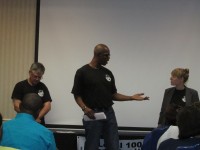
Dallas One of the most amazing things about being an organizer, whether of community or labor-based organizations, remains the excitement of learning deeply what people really want – and expect – of their own organizations. For 33 years, Local 100 of the United Labor Unions has held an annual leadership conference. Many times it is largely training. Sometimes the speakers are what people remember. Other times campaigns have been planned or organizing drives hammered out or crises, both internal and external, confronted and addressed. This year’s meeting in Dallas combined almost all of those items for over 60 Local 100 leaders and stewards including extensive training on enrollment within Affordable Care Act in Arkansas, Louisiana, and Texas along with stewards training on the worksites, plans for a minimum wage increase campaign, a great, inspiring speech by Dallas Congresswoman and longtime ally, Edie Bernice Johnson (D-TX), and detailed training for the coming launch of Local 100’s Citizen Wealth Centers.

The highlight though was a session planned in some sidebar conversations between Toney Orr, Local 100’s Arkansas State Director, and Dine’ Butler, Local 100’s New Orleans organizer, when they were representing the union in the recent annual meetings of ACORN International and its partners in Bristol, England. The framework of the session was the role the Local leadership needed to play in doing outreach, building on the Obamacare enrollment effort, around fighting to increase the minimum of wage. Toney and Dine’ broke the leaders into a half-dozen groups to discuss a mass door knocking program in their communities to determine what issues they wanted to see the Local address as well as what services and representation they wanted included in our new Citizen Wealth Centers.
Many of the results were predictable, some surprising, and all of them invaluable as the leaders envisioned a broader role for the union and an expanded view for themselves and their organization in addressing workers’ issues deeply and comprehensively. Here comes the list:
· Credit counseling and developing an emergency small loan fund
· Addressing the issue of ex-felons in the community and the criminal injustice system
· Representing members on resolving problems with medical bills
· Childcare and recreation
· Helping the community win home and street repairs
· Safety issues for the elderly
· Nuisance abatement and police protection in the community
· Bulk trash pickup
· Workman’s compensation claims
· Police harassment
· Voter registration and voter education
· Traffic ticket camera fraud
· Medicaid expansion
· Social Security issues
· Veterans benefits
· How to acquire student loans and handle student debts
· Applying for college or training
· Bus passes and transportation costs
· Advocacy hotline
· Unemployment appeals
· Document reviews for members
· Rising gas and electric bills
· Property tax and zoning issues
You’re wondering why no one mentioned wages aren’t you? Everyone is supposed to know that the only thing unions and their members care about is money and “what’s in it for me?” Well, you heard the list, and this list just includes the things I could keep up with while writing as fast as each group reported.
Certainly there were lots of worker issues and concerns around healthcare, which we all expected, but there were as many issues raised about how the union could improve the communities where their members and other workers lived. The union leaders were demanding to fill the vacuum in their communities as well as their workplaces. Furthermore in looking at the array of representation they wanted from the Citizen Wealth Centers, they were looking at their role as stewards not simply in keeping their members on the job and improving their working conditions but using their hard won advocacy and organizing skills and dealing to deal with the whole array of issues faced by our members and community as they intersected with government and with financial issues.
For the organizers the job now becomes how much is possible, but the leaders of Local 100 were clear about expressing their mandate and their vision for their union and its inspiring range and depth might be just the kind of prescription needed to take the labor movement off the death watch, if we can convert what we heard into actions and programs.





